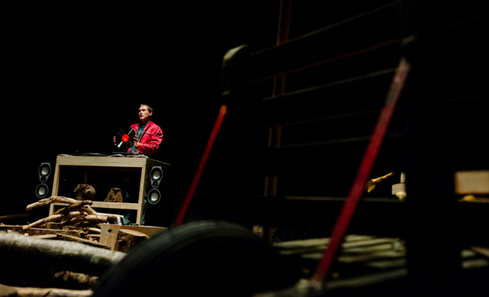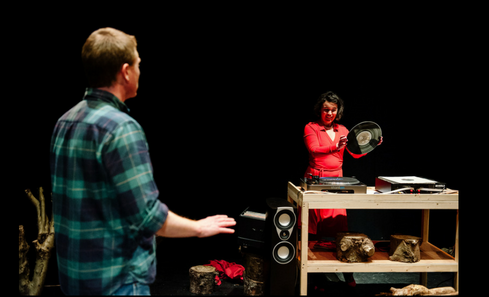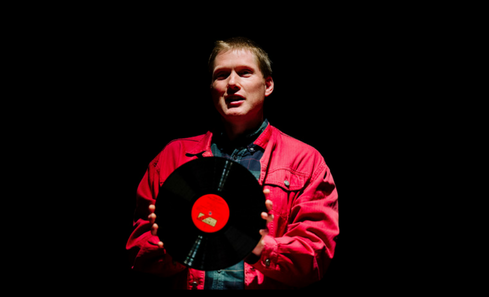
This autumn, Total Theatre Award winners Two Destination Language will be touring with Manpower: a new theatre piece, which explores men's life, expectations, work and economics in the years since Britain voted to be a part of Europe.
According to the creators, 'silent battles of power drive a politically complex commentary on England’s working men over the last 40 years, as a British man and an Eastern European woman share the stage.'
We caught up with the company artist Alister Lownie to find out more about this new play, its message, and what they hope the audience will take away.
We began working on Manpower because we were interested in exploring questions around gender and power, particularly around expectations of masculinity. We worked with actions and costumes, and travelled quite far into music videos - the archetypal rocker, but also the man in his garden shed listening to the music, remembering those videos.
There were some great things we made, but we weren't entirely satisfied with the show. It was already booked for a tour later in the year when Brexit kicked off, and we decided to remake the piece, playing on some of the themes raised by the political campaigns around Brexit.
As we worked on the show, Donald Trump moved from a silly joke to a remote possibility to a genuine candidate and then to President. There couldn't be a better time for a conversation about men and power.
Artistically, there were real challenges in deciding what shape the work should have. Lots of the best material we made early in our process offered fantastic moments on the stage, but fitting them together worked only if we saw the end result like a garden of men, offering those men in different shapes and sizes and colours carefully positioned just as plants might be.
It's possible to make theatre like that, but the time-based nature of the audience experience means that does't always feel accessible. When we tried making something more narrative using autobiographical material, the focus on power we lacked created an unhelpful tension with the other material. That's when we discovered an upside to Brexit: it gave us a route in, and we worked pretty quickly to create a new shape and content for the show.

Our dramaturg helped us keep a narrow focus, and that meant cutting lots of the material we loved. But there's a difficulty in making something which seems immediately relevant: as Trump's candidacy progressed, we felt increasingly ineffectual, as theatre makers, to change the kinds of behaviour and language we felt should be resisted.
Events in America exceeded anything we might have imagined, and so when we opened our new work, we felt deflated. It was only as we performed the work that audience conversations and feedback helped us feel there was an impact, that there was a role for theatre asking questions, making gentle challenges, in a political space where bullying, sexism and racism had been authorised by democracy.
First, we may have political views as citizens (possibly clear from answers above), but we don't see it as our role, making art, to preach or persuade. It's our role to question assumptions, to encourage a re-examination of opinions, language, beliefs. That means we aren't trying to alienate audience members we might disagree with.
In fact, we look forward to joining audiences in the bar after shows and hearing from people with a range of political views. The range of online news sources and social media make it easy to feel "everyone" agrees with you, so bringing people together in one room - as theatre does - enables some really interesting debate. For that to happen, we have to let a spectrum of opinion feel represented.
Second, we are a collaboration between a Scot and a Bulgarian. Brexit is more than just potential food shortages and increased tech prices: there are real questions around what the future might hold, and where (geographically) a desirable future might be.
That's about migration, which viewed historically has visible effects on not just local populations, but the infrastructure of our society. Cities are built on and function around assumptions about economic migrants, just as much as national borders. The scale of migration - in terms of distance travelled, and numbers of people - is based on the perception of difference: where a person has the chance to make the life they want.

Third, we mean something very simple: politics is complex. It's useful, of course, to reduce things to soundbites, media-friendly images and catchy campaign slogans. But there wouldn't be political debate without there being real questions to answer.
We want them to ask questions, and to talk with one another. We want them to explore possibilities for thinking differently, for behaving differently. We want them, at the very least, to desire something better than the world we have.
After the show, we've had impromptu inter-generational history lessons, conversations about fruit-picking, beer-tastings . . . the theatre is a prompt for the interactions which follow. For us, it's really important to welcome the variety of those.
We've started work on a new show for 2019, about belonging and otherness. Much of next year will be taken up with developing that into a completed piece, but we're also going to be touring a bit more with Manpower and also with Fallen Fruit, which was at Edinburgh's Summerhall in August and will be in and beyond the UK.
This autumn's Manpower tour is the first time we've toured work in Scotland, and we hope we'll build the network of presenters helping us bring theatre to audiences around the country. We also work with people in their own places, making performances which reflect something of their communities and histories: as ever, these projects are dependent on funding, but we're excited about what's in the pipeline.
Manpower opens at the Traverse Theatre on 26 September, and will be touring throughout the country until 28 November. Full tour and ticket details can be found at twodestinationlanguage.com/projects/manpower.